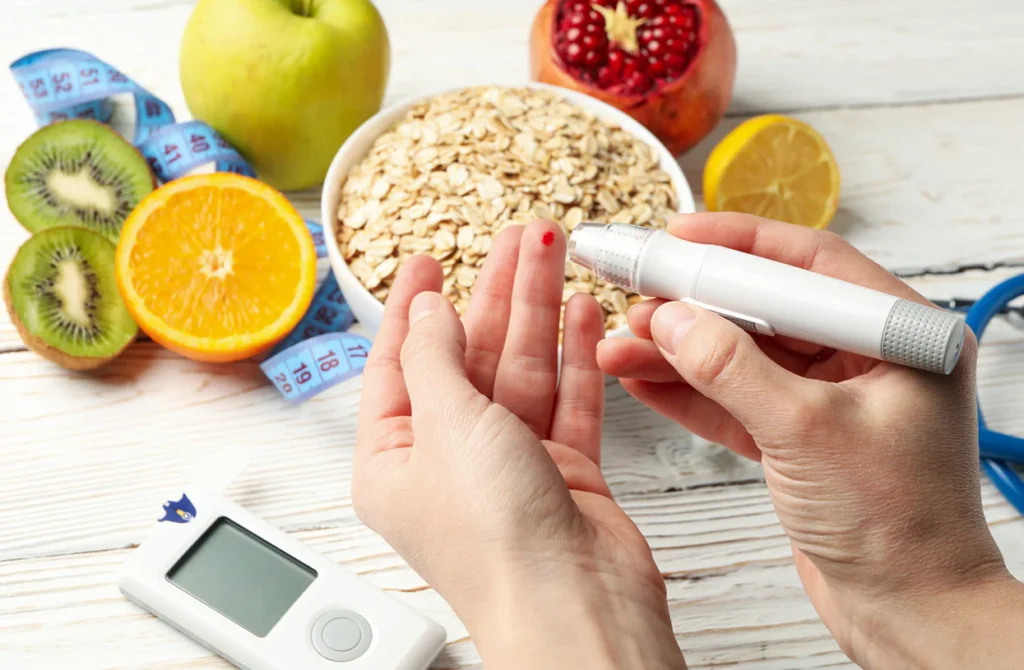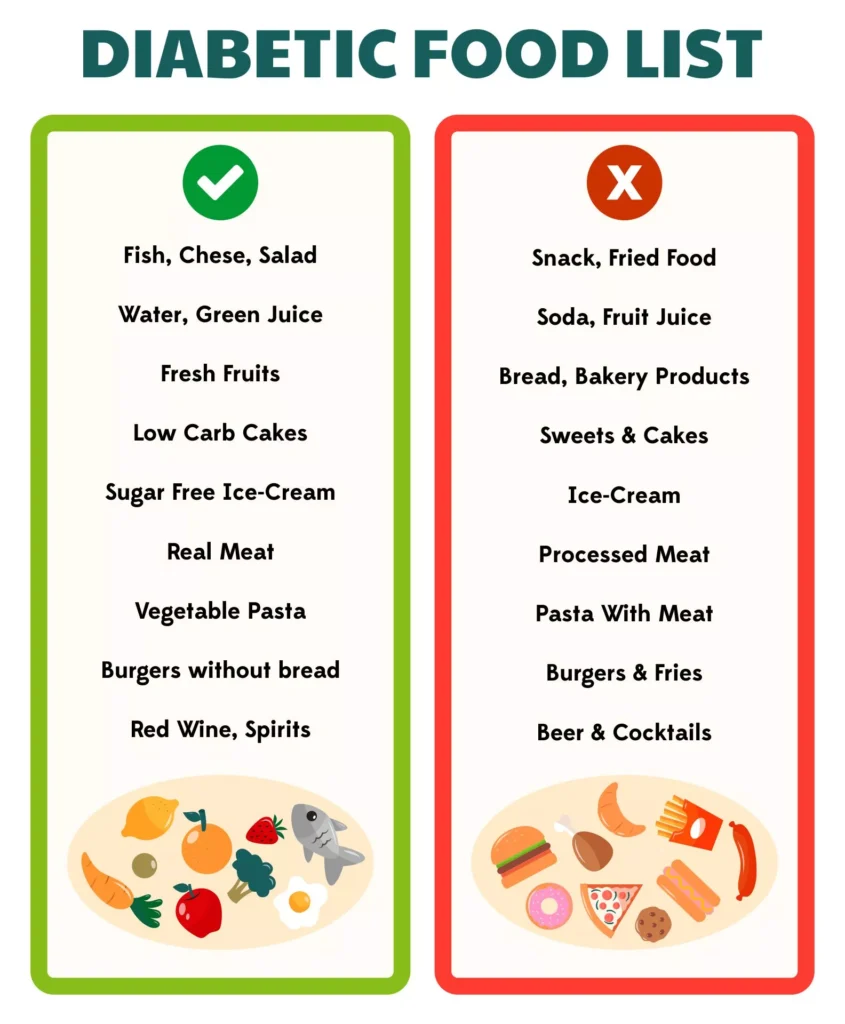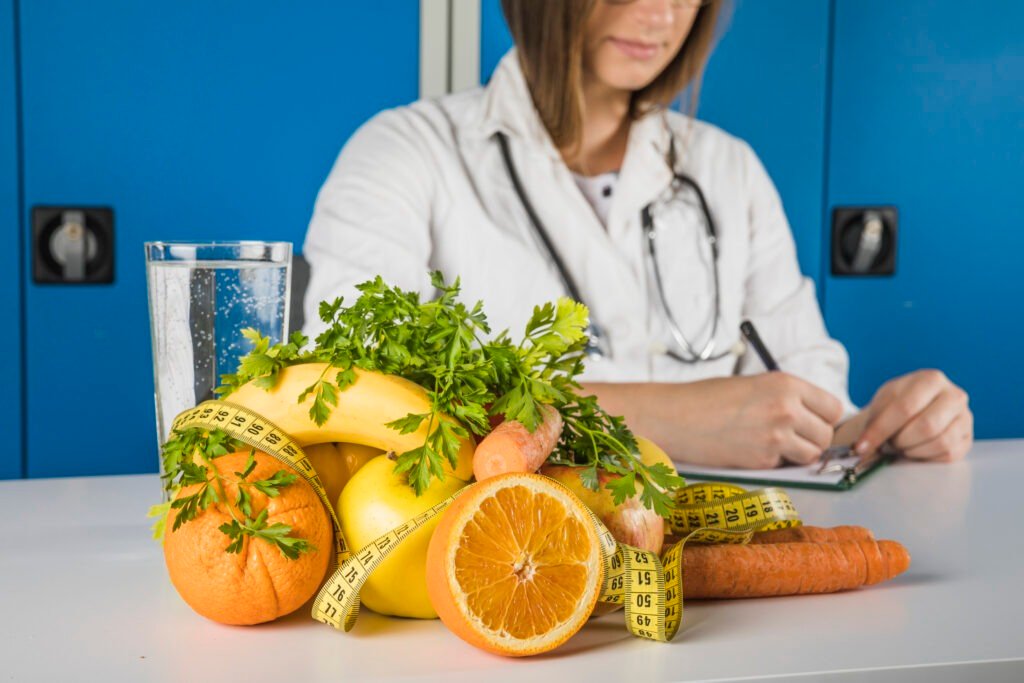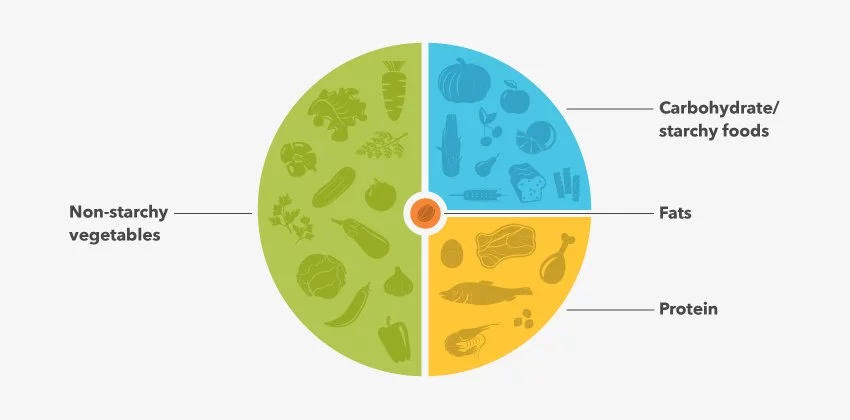
Table of Contents
Introduction:-
Diabetes is a chronic condition affecting millions of individuals globally. Managing diabetes effectively requires a careful approach to diet and consistent monitoring of blood sugar levels. This comprehensive diabetic food chart, curated by the best dietitian in Delhi, aims to help people with diabetes maintain a balanced diet and manage their blood sugar levels effectively. This plan provides a variety of nutritious meals Customized Diet Plans to promote overall health.
Diabetic Food Chart for Diabetes Patients:-
Following a nutritious and satiating weekly meal plan is essential to managing diabetes. Our motive behind presenting you with this diabetic food chart which is curated by the best dietitian in Delhi is to make mealtimes more manageable. Along with this, we also attempt to make it balanced in terms of essential nutrients. The meal plans, snacks, and beverages included in this diet are easy to make and realistic to follow. The foods are a good mix of complex carbs, proteins, and healthy fats.
Complex carbohydrates are evenly distributed throughout the day’s meals. This seven-day meal plan for diabetics contains between 30 and 45 grams of carbohydrates per meal on average. There are fewer than 15 to 25 grams of carbohydrates in each snack. To avoid blood sugar spikes, we have kept the amount of refined or white carbs to a bare minimum. So try following this diabetic food chart, along with engaging in physical muscle-building exercises. You may effectively manage and maintain healthy levels of diabetes with the help of these two lifestyle strategies.

7-Day Diabetic Food Chart By Best Dietitian In Delhi:-
1. Reduce the amount of oil you use and prefer to sauté food instead of deep-frying it.
2. One must avoid sugary beverages and consume plenty of water in a day to hydrate the body without increasing the blood sugar level.
3. One should avoid taking very large quantities of food at one time and also avoid having very sweet items to control the blood sugar level.
4. From the given recommendations, include regular exercise in your eating scheme for enhanced diabetes management.
7-Day Diabetic Food Chart
Day 1
- Breakfast: Greek yogurt with berries and nuts
- Lunch: Grilled chicken salad (or for a vegetarian option, Grilled tofu salad)
- Snack: Apple slices with almond butter
- Dinner: Baked salmon with steamed vegetables (or for a vegetarian option, Baked chickpea patties with steamed vegetables)
Day 2
- Breakfast: Oatmeal with chia seeds and flaxseeds
- Lunch: Quinoa salad with black beans and avocado (or for a non-veg option, Chicken and quinoa salad)
- Snack: Carrot sticks with hummus
- Dinner: Stir-fried tofu with broccoli and bell peppers (or for a non-veg option, Stir-fried chicken with broccoli and bell peppers)
Day 3
- Breakfast: Scrambled eggs with spinach and tomatoes
- Lunch: Turkey and veggie wrap (or for a vegetarian option, Hummus and veggie wrap)
- Snack: Greek yogurt with a handful of nuts like walnuts and almond
- Dinner: Chicken stir-fry with mixed vegetables (or for a vegetarian option, Tofu stir-fry with mixed vegetables)
Day 4
- Breakfast: Smoothie with spinach, berries, and almond milk or low-fat cow milk
- Lunch: Lentil soup with a side salad (or for a non-veg option, Chicken soup with a side salad)
- Snack: Cottage cheese with sliced peaches
- Dinner: Grilled shrimp with asparagus and sweet potato (or for a vegetarian option, Grilled portobello mushrooms with asparagus and sweet potato)
Day 5
- Breakfast: Whole grain toast with avocado and 2 scrambled eggs
- Lunch: Barley salad with chickpeas and cucumbers (or for a non-veg option, Barley salad with grilled chicken)
- Snack: A small handful of almonds
- Dinner: Beef and vegetable kebabs with quinoa (or for a vegetarian option, Vegetable and halloumi kebabs with quinoa)

Day 6
- Breakfast: Chia pudding with fresh fruit
- Lunch: Salmon salad with spinach and walnuts (or for a vegetarian option, Mixed bean salad with spinach and walnuts)
- Snack: Celery sticks with peanut butter
- Dinner: Turkey meatballs with zucchini noodles (or for a vegetarian option, Lentil meatballs with zucchini noodles)
Day 7
- Breakfast: Smoothie with spinach, banana, and almond milk
- Lunch: Chicken Caesar salad with whole grain croutons (or for a vegetarian option, Caesar salad with chickpeas and whole grain croutons)
- Snack: Berries and cottage cheese
- Dinner: Stuffed bell peppers with ground turkey and brown rice (or for a vegetarian option, Stuffed bell peppers with quinoa and black beans)

Benefits of Diabetic Food Chart By The Best Dietitian In Delhi:-
1. Weight Management And Improved Blood Sugar Levels:
The major benefit of following this diabetic food chart is that you can easily regulate your daily calorie intake. Being a low-calorie diet plan greatly benefits you in controlling diabetes. Moreover, according to the National Institute of Health published research, low-calorie diets improve glycemic control and help enhance insulin sensitivity. Additionally, the fat stored in organs like the liver is reduced, which improves insulin metabolism.
2. Enhanced Mood and Mental Health:
A well-balanced diet, as outlined in this Diabetic Food Chart by the Customized Diet Plans, can significantly enhance the mood and mental health of diabetes patients. Less fluctuation in blood sugar helps to reduce chances of mood swings and constant fatigue, while nutrient-rich foods rich in omega-3 fatty acids and healthy fats promote cognitive function and reduce inflammation. Foods rich in complex carbohydrates increase serotonin levels, which in turn promote feelings of happiness.
Conclusion:-
In conclusion, following a well-structured Diabetic Food Chart tailored by the Best Dietitian in Delhi Monika Manchanda can significantly enhance diabetes management and overall well-being. Thus, sticking to the diabetic food chart that is low in carbohydrates, portioned, and associated with regular meal intake, you will be able to maintain stable blood glucose levels and achieve sustainable health improvements. Whether you choose to eat vegetarian or non-vegetarian food, the major focus is to make the right choices for a healthy diet and stick to these measures. This approach not only helps in managing diabetes effectively but also sets a foundation for sustained healthy eating habits.
FAQs:-
1. How to reduce sugar in 7 days?
- To reduce sugar intake in 7 days, the following strategies should be applied: First, check the nutritional label of added sugars including sodas, candies, and sugary cereals and avoid them. Foods with a lot of sugar should not be taken, rather foods with little or no sugar, and fiber-rich foods like vegetables and whole grains should be taken. Avoid all foods and beverages containing sweeteners and use water, herbal teas, and diluted fruit juices and suppress hunger with protein or healthy fat products.
2. What is the best eating schedule for diabetics?
- The best feeding schedule for a diabetic person is usually characterized by well-designed, well-balanced meals and snacks spaced evenly throughout the day. The recommendation is to have three meals a day, which are breakfast, lunch, and dinner, and one to two healthy between-meal snacks. Take meals at the set times in a day. For instance, consume your breakfast in the morning not later than an hour after waking up, and space your meals and snacks by about 3-4 hours. This approach is beneficial in maintaining steadiness of the blood sugar levels and in ensuring that there is a constant supply of energy all throughout the day.
3. What is a good daily diet for diabetics?
- The meal that the diabetics should take should have grains such as oatmeal or brown rice, protein such as grilled chicken or tofu, and manifold vegetables without any starchy parts. Sweet foods and unhealthy foods should not be brought in large portions with the intention of replacing them with fruits and healthy foods like nuts and seeds. Avoid as much as possible foods that contain calories and instead, drink water and other products and foods without sugar.

Recent Comments